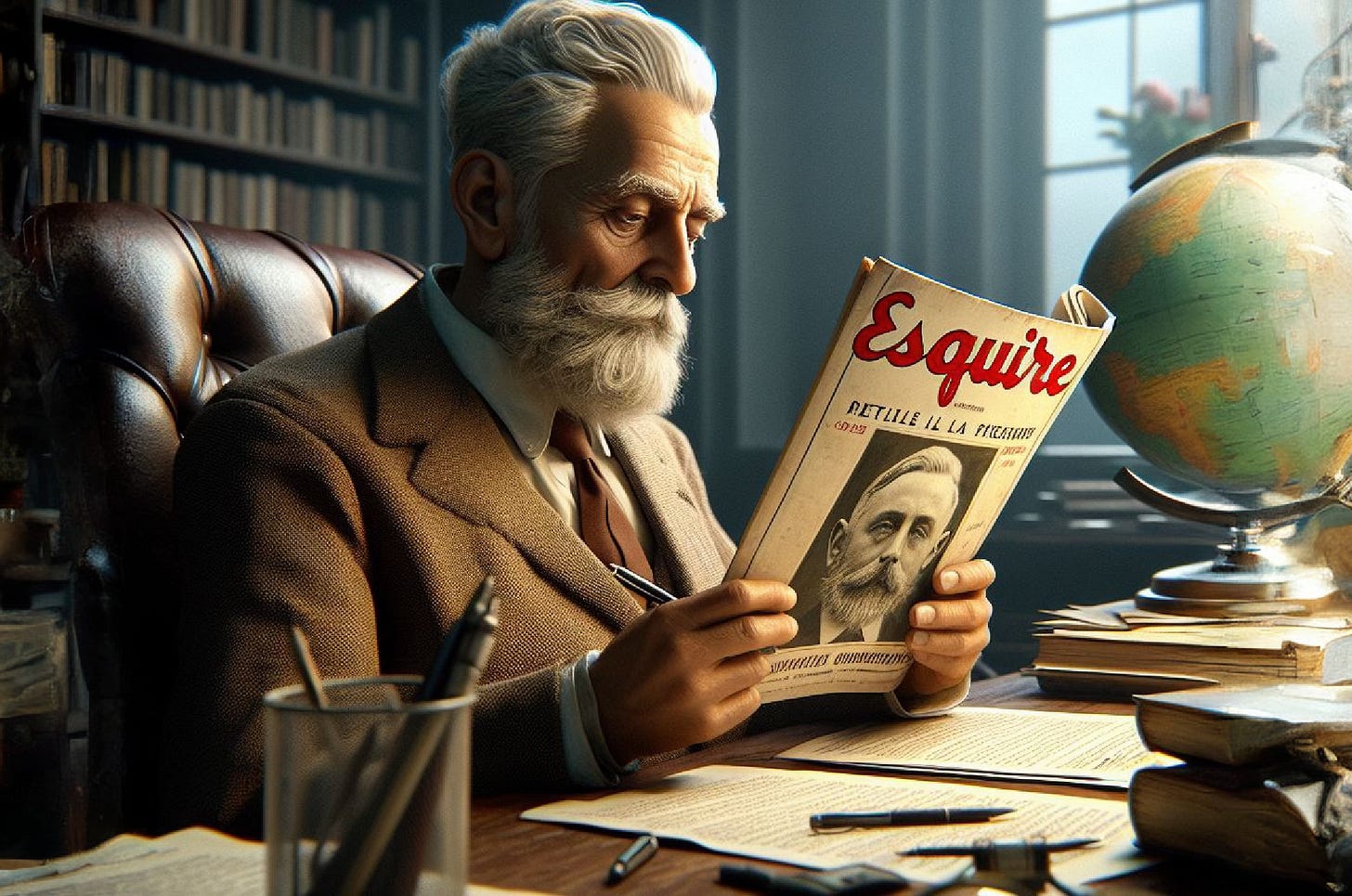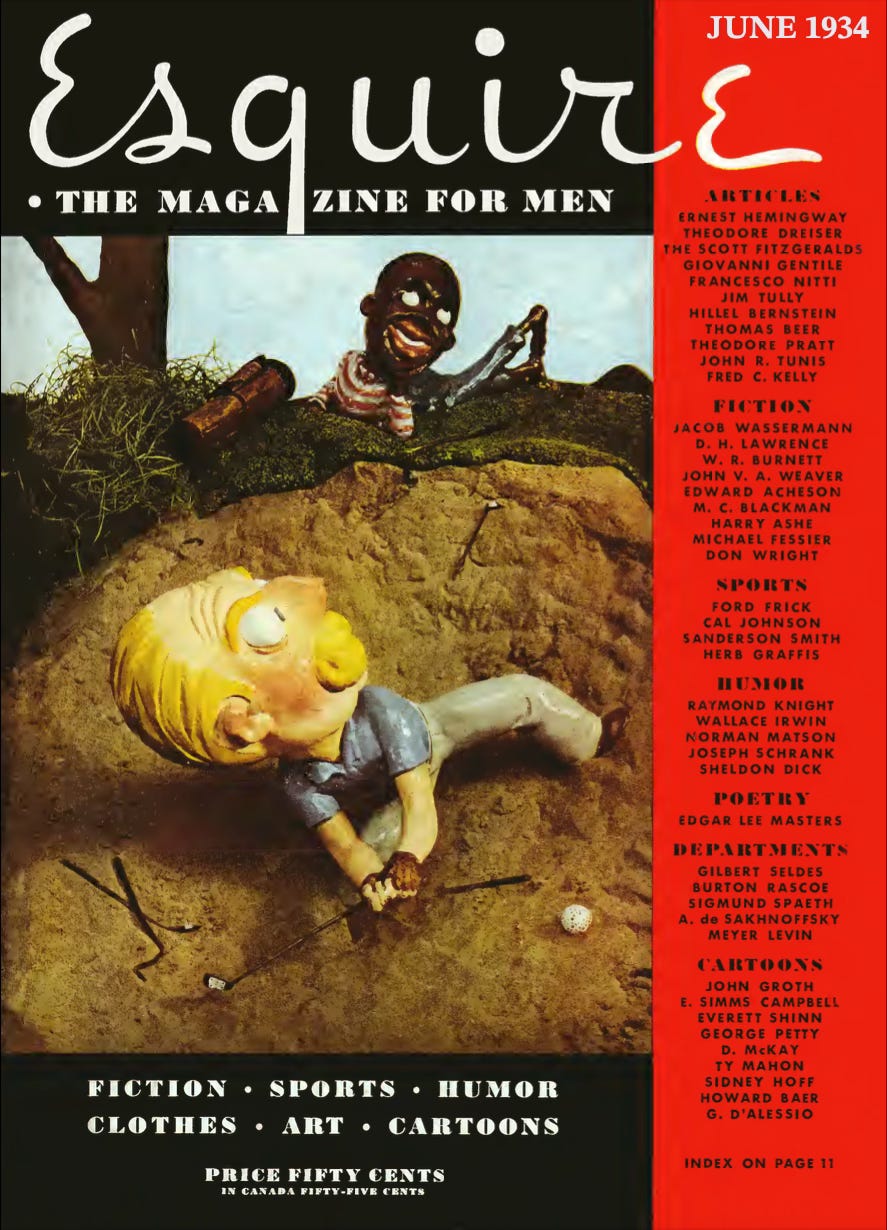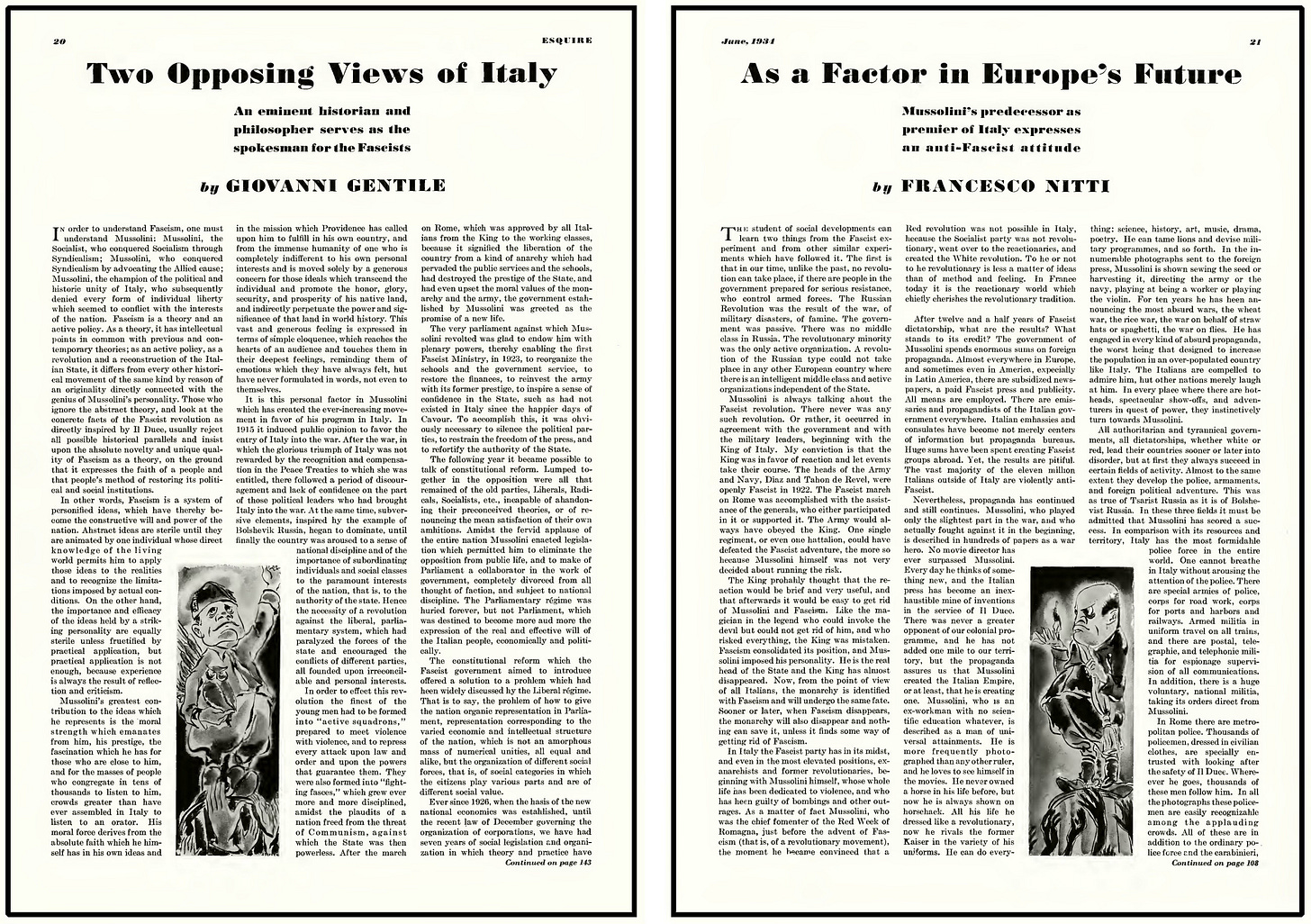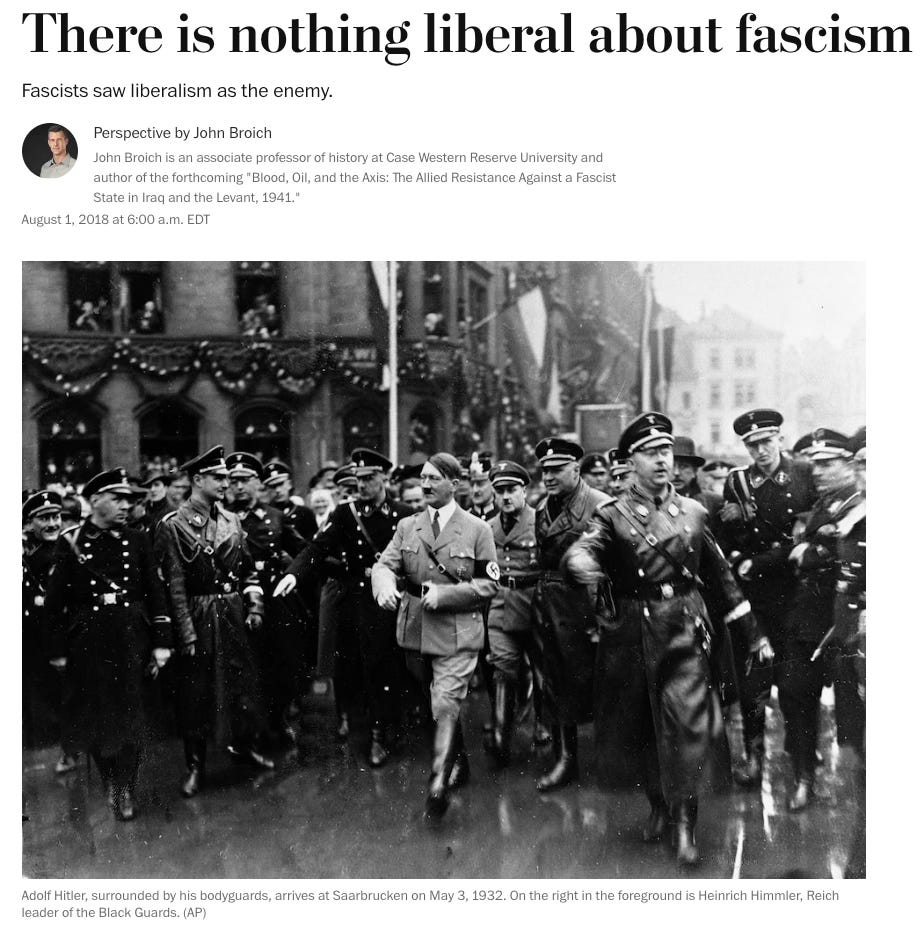Compelled to be Free?
“Classical liberalism spells individualism, Fascism spells government.” – Benito Mussolini
Americans in 2024 have a president who frequently, and falsely, tells us we live under Jim Crow 2.0. We are rightly shocked by reminders that those racist laws lasted until the 1960s, and we are also shocked by images of Little Black Sambo and his white oppressor, but many of us are too young to remember when such images were popularized. For a reminder of that, see the June 1934 cover of Esquire magazine, an issue that might be shocking for a less obvious reason: Esquire published a defense of Fascism by Benito Mussolini’s chief spokesman, the eminent professor Giovanni Gentile.
We will learn more about Gentile shortly. But first, if you denounce the racists of 1934, were you also aware that America was also publicly debating the legitimacy of Fascism less than 10 years before the Holocaust?
We all must be aware of it, since our current president says America must defeat a rising Fascism or lose our democracy. Our nation has been through this before, and since the president makes important speeches about it, everyone must know this is our second national conversation about it in less than 100 years.
If you are too young to be aware of that first public debate, do you believe the old white generation of ’34 was morally and mentally bankrupt because they popularized racism? If you are aware of the Fascism angle, do you think those old people were doubly evil?
It’s an important question, because after the Hamas attack on Israel of October 7, 2023, America is having another public debate about what group can justifiably commit political mass murder. Is it the brown Palestinians led by Hamas, or the white-adjacent Jews led by Israel?
You can pick whatever side you want, but the American jury is still out on the question.
Instead of deciding who can most persuasively legitimize foreign genocide, however, this article tries to shed light on our domestic Fascism. To that end, I ask two final questions:
Do you accept Google’s apology that images of Little Black Sambo as a Nazi soldier were a sincere attempt to boost diversity that merely missed the mark? If you do, then you accept that an image of the most-oppressed man can accidentally become an image of the worst of all oppressors.
And do you believe America’s conservatives are 2024’s Fascists?
If anyone truly wants to know how the original Fascists justified their ideology, we must listen to what they, themselves, said and did about it. So let’s go back to 1934 and watch.
In This House We Believe
Before we meet our eminent professor, let’s take a moment to freely admit that America in 2024 must again define who she is. In the process, maybe we Americans can find out who we are. This article attempts to help us in that task.
Maybe, in our divided American house, we are opposed to the extreme individualists who deny our shared democracy. Surely none of us want a return to a previous four years of illegality, while all of us will submit ourselves to the rule of law – because no one is above the law, and we must not remain a house divided.
Maybe we want a new youthful politics that refashions the broken forms of harmful, individualistic, middle-class life. A politics that reimagines the content, character, and faith of Americans in a way that will take us forward, away from racism and Fascism.
Maybe we believe in the America that prevailed over Fascism the first time. That we are stronger together. That we must have a concentrated democracy that does not suppress individual initiative but delivers a concrete system of economic and political liberty for all.
Those are all rational things to believe, right? So let’s meet our professor.
The Fascist Spokesman
Esquire magazine was established in 1933, and is still publishing in 2024. In June 1934, they published an article by the well-respected Italian professor Giovanni Gentile. Not only did he teach at esteemed universities in Rome, Palermo, and Pisa, but he served as Italy’s Minister for Public Education and wrote a 1922 book on The Reform of Education. He was also a member of the Fascist Grand Council from 1925 to 1929.
His article in Esquire appeared on page 20 under the headline “Two Opposing Views of Italy.” A second essay, penned by former Prime Minister Francesco Nitti, the immediate and anti-Fascist predecessor to Benito Mussolini, appeared on page 21 and was titled, “As a Factor in Europe’s Future.”
First, the Fascist spokesman.
“In order to understand fascism, one must understand Mussolini,” Giovanni Gentile wrote in his opening paragraph. “Mussolini, the Socialist, who conquered Socialism” and Mussolini who “subsequently denied every form of individual liberty which seemed to conflict with the interests of the nation.”
That’s a bold and factual admission of the ideology’s Socialist roots and what we understand about it today: that Fascism ruthlessly denies any individual right that conflicts with the State.
Mussolini had been more clear about that in his 1932 Doctrine of Fascism, co-authored by Gentile. He held an “anti-individualistic” conception of life. He was “opposed to classical liberalism which arose as a reaction to absolutism.” And he mounted a coup against the “debris” of the “liberal regime” because they “denied the State in the name of the individual.”
Gentile was more nuanced in Esquire, reassuring his readers that Mussolini was “completely indifferent to his own personal interests and is moved solely by a generous concern for those ideals which transcend the individual.”
Because of their concerns, he said the Fascists had tried to offer political solutions “to a problem which had been widely discussed by the Liberal regime.” But they could not overcome the selfishness of the “old parties” that were “incapable of abandoning their preconceived theories, or of renouncing the mean satisfaction of their own ambitions.”
The problem had been twofold: 1) that Italians were entitled to a new “organic” model of political Parliamentary representation that corresponded to the “different social values” held by people who lived in an intersectional web of “social categories;” and 2) that the Liberal regime was incapable of delivering it.
As Gentile had written earlier in his Origins and Doctrine of Fascism (separate from his work with Mussolini), “Italy seemed fatigued, repelled by the prosaic middle-class, materialistic life that it endured.” The country needed to “infuse a consciousness of renewal and a vigorous sentiment of opposition among the youth [of Italy] against the prevailing culture and politics.”
The people eventually found “a faith in a moral reality” for which they would live and die, “even to the point of using violence to destroy an established order to create another.” Naturally, that faith was Fascism.
“That revolution was undertaken and pursued with energy until the goal was attained,” Gentile wrote in Origins. “The illegalities of the four-year period (1919-1922) [were] brushed aside by a new youthful faith, and the Fasci became the new Italy.”
Leading up to the revolution, Italian influencers – newspapers, magazines, youth groups, etc. – knew that “everyone would have to subject themselves to the discipline of the law.” Unfortunately for them, as Gentile admitted in Esquire, “it was obviously necessary to silence the political parties, to restrain the freedom of the press, and to refortify the authority of the State.”
Mussolini had grown tired of the national conversation. The stubborn opposition had forced him to “declare a revolution against the liberal, parliamentary system.”
Gentile assured readers that the “entire nation” applauded as “Mussolini enacted legislation which permitted him to eliminate the opposition from public life.” And, under Il Duce, “the Parliamentary regime was buried forever, but not Parliament, which was destined to become more and more the expression of the real and effective will of the Italian people, economically and politically.”
The theme of the “individualism of the old-time Liberals” appears repeatedly in the works of both men, and in Esquire Gentile stresses “the importance of subordinating individuals and social classes to … the authority of the state.”
Both Mussolini and Gentile frequently refer to their Fascist State as a democracy. Mussolini called it a “concentrated democracy” and “an organized, centralized, authoritarian democracy.”
Gentile wrote in Origins that Fascism “aspires to be the most perfect form of liberalism and democracy,” and that “the Nationalist state was an aristocratic state … The Fascist State, on the other hand, is a popular state, and, in that sense, a democratic state par excellence.”
And finally, Gentile concluded in Esquire, “Today [Mussolini] is perhaps the one Statesman who is regarded by the entire world as the most resolute and sincere believer in disarmament. Behind II Duce stands the entire Italian people, whose one desire is to grow and prosper in a free world, cleansed of the horrors of war, and restrained by a sense of justice.”
Who are the ‘Old-Time Liberals’?
It is obviously necessary for us to understand the identity of those hated “old-time Liberals.” After all, for the “mean satisfaction of their own ambitions” they had created political gridlock and forced the Fascist revolution upon themselves.
Gentile’s definition of “Liberal” does not correspond to America’s modern Liberal ethos, but to a worldview once known as “classical liberalism.”
Political and economic theorists of the 17th and 18th century – among them John Locke and Adam Smith – invented classical liberalism that ended the rule of absolute monarchies. America was founded by classical liberals – James Madison, Ben Franklin, and many others – who believed their own revolution could break the absolute power of the British monarchy.
Some of today’s classical liberals are called “conservatives.” Many, including your author, are Trump voters. Others call themselves “disaffected liberals.” Some are more recent converts, having been forced out of “the Left” by its rising intolerance of America’s traditional individual rights and its embrace of ever-increasing government power. They do not call themselves “conservatives,” but they are doing things like founding new universities that champion a much more traditional American form of education than the universities they left behind.
Their ranks include people like economist Thomas Sowell, Justice Clarence Thomas, former New York Times writer Bari Weiss, environmental activist and author Michael Shellenberger, Stanford professor Victor Davis Hanson, and recent presidential candidate Vivek Ramaswamy.
Although they may disagree on some of the finer points, they all champion individual rights, an economy based on free exchange, and less powerful government – all solidly anti-Fascist positions.
Mussolini would oppose our classical liberals just like he opposed them in 1922. Our modern “anti-Fascists” oppose classical liberals for the same reasons. They are repelled by the “prosaic middle-class, materialistic life,” and by the “old Liberal regime” that has failed to give them the youthful, “organic” form of political representation they deserve. And they are committed to revolution, “even to the point of using violence to destroy an established order to create another.”
We know how the older revolution finally worked out in 1945, of course, but can you say you would have opposed Fascism in 1922? Or in 1934? Do you oppose it in 2024?
Gentile’s Anti-Fascist Opposition
Among Mussolini’s detractors was former Prime Minister Francesco Nitti, a man of the Classical Radical far left who moved toward the center as the Fascists took control. As an economist and politician, Nitti was out of his league against the philosopher Gentile, and he had lost his elected position to Mussolini long ago.
He started out by making a point all Americans should listen to.
“Mussolini is always talking about Fascist revolution. There never was any such revolution. Or rather, it occurred in agreement with the government and with the military leaders, beginning with the King of Italy. … The Fascist march on Rome was accomplished with the assistance of the generals, who either participated in it or supported it.”
If our Joint Chiefs of the military (or the chiefs of the FBI and CIA) participated in a coup that was supported by the president, are you sure you would you oppose them? In today’s media landscape, would you even know it had happened?
“After twelve and a half years of Fascist dictatorship, what are the results?” Nitti asked. “Mussolini spends enormous sums on foreign propaganda. Almost everywhere in Europe, and sometimes even in America, especially in Latin America, there are subsidized newspapers, a paid Fascist press and publicity.”
If your government spent hundreds of millions of dollars on a mass censorship and propaganda campaign, aided and abetted by the press, would you be able to see it? And if you did see it, what would you do about it?
“No movie director has ever surpassed Mussolini,” Nitti observed. “Every day he thinks of something new, and the Italian press has become an inexhaustible mine of inventions in the service of Il Duce.” Nitti also claimed he had a “great quantity of secret orders issued by Mussolini to the Italian press: what to say and how to say it. Everything is controlled, even the kind of type is selected which will be the most effective with the public and redound to the glory of Il Duce.”
Obviously, no Fascist dictator could force the New York Times to use the Comic Sans font on their website. But do you think any dictator could mount a coup and destroy our democracy while under simultaneous attack by powerful Hollywood actors and directors, the biggest tech corporations in human history, mainstream news outlets, and the federal government’s Intelligence Community?
“One cannot breathe in Italy without arousing the attention of the police,” Nitti noted, informing us there were armed militias everywhere, even in Italian train stations.
In the recent past, we were informed by the press that our own National Guard cannot arrest people, seize drugs, or conduct searches at the border. Today the press tells us the Guard has been deployed to conduct searches and help police arrest people in the New York City subways.
“Children and young people are simultaneously taught to be servile towards the government and arrogant and threatening to others,” he wrote. “Everybody in Italy must admire the same things, which involves a lowering of all moral standards. In the universities, the schools, in intellectual life – there is no limit to servility.”
Well, that sounds pretty bad. But my wife is a 5th grade public school teacher. She and I have put four kids through college. We can bear witness to the rising number of “arrogant and threatening” students who all “admire the same things,” and I’ll bet you can too. Our government orders us to lower our moral standards, legally bans any “healthcare” that is not “gender affirming,” and uses our tax dollars to subsidize the medical mutilation of children.
We hear from the press that only Fascists want to slash the size and power of government. We hear that certain state politicians want to keep a presidential candidate off the ballot, and that an illegitimate Supreme Court ruled 9-0 that states do not have that power. We hear from political speeches that only insurrectionists interfere with elections.
The media declared a few years ago “We are all Socialists now.” That was wrong, even though lots of people publicly admit to being Socialists.
In 2024, we have a political party called Democratic Socialists of America, and America is apparently filled with Fascists even though no one will admit to being one.
That’s Not Who We Are
Benito Mussolini promised Italians a “concentrated democracy.” Anyone can say the word democracy,and almost everyone will believe they mean the individual freedom of classical liberalism – the social construct opposed by real-world Fascists. But what they really mean is anyone’s guess.
To help us figure this out, we will now meet University of California sociologist Robert Nisbet, who wrote in May 1943 that it would be “a mistake, and perhaps a dangerous one, to find the essence of totalitarianism solely in its dictatorial form of government.”
Nisbet founded the UC Berkeley Department of Sociology, was a dean at UC Riverside, went to the University of Arizona, and was appointed to the Albert Schweitzer Chair at Columbia University, where he retired in 1978.
“We are hardly prepared intellectually if we feel we can take refuge in an educational system which simply warns its students to beware of individual despotism and doctrines of force and absolutism,” he wrote in the May 1943 issue of The Journal of Politics. “Totalitarianism, if it arises in America, will not make its ideological appearance so crudely.”
And indeed it has not. Some species of inbred totalitarianism – conceived by its two Socialist cousins – has already been birthed in the United States, thanks largely to an educational system that fully embraced Nisbet’s warning as an instruction manual.
For example, Diversity, Equity and Inclusion says that one ethnic group – with its ethic of “whiteness” – is responsible for all the evils in world history. And it insists that Asians and Jews are “white adjacent” and conservative black men are “the black face of white supremacy.” But DEI is part of a larger totalitarian creed that is not only about race. Like Fascism, it opposes every tenet of classical liberalism.
The new totalitarians are neither traditional Socialists nor historical Fascists. They don’t need government control of the means of production like the old Soviets. And they don’t need to force private corporations to do their political will like the old Fascists.
The biggest and most powerful corporations in world history have volunteered to serve with government in a political war. The war is being waged against the society that created whiteness. Anyone who refuses to join that public-private partnership must be forced to join (or be ostracized) for the benefit of the community.
Some Democrats and some Republicans are part of this power structure. And the goal of this combined power structure is not to free minorities from an oppressive government, but to compel everyone to be free from the whiteness of their fellow citizens.
“Compelled to be free?” you ask. “What Fascist came up with that idea?” That would be the father of the French Revolution, Jean Jacques Rousseau, who wrote the Social Contract in 1762.
In order to realize a perfect democracy, Rousseau wrote, “Each citizen would be completely independent of all his fellow men, and absolutely dependent upon the State: for it is only by the force of the State that the liberty of its members can be secured.”
In modern terms, Rousseau’s ideas mean that not only will each person be completely free from societal whiteness, they will all be absolutely dependent on the public-private partnership. But since corporations do not enforce laws, the laws of the State will force you to be free.
“There is no other single Statement in all Rousseau’s writings which better serves as the theme of his political philosophy than this,” Nisbet wrote. “His ideal is independence for the individual, but independence, it will be observed, not from the State but from fellow members of society.”
You’ve probably heard the phrase “you may not be interested in politics, but politics is interested in you.” Rousseau’s community is a political community that is indistinguishable from the State, shares all the qualities of the State, enforces the moral unity of the State, and allows no competing institutions outside the State.
Surely you have noticed – out in the real world – that no government can force people to believe in it. But it can punish unbelievers. Rousseau wrote that “anyone who refuses obedience to the general will is forced to it by the whole body,” and in America today the general will is the community.
Members of our anti-Fascist anti-racist power structure believe that compelling speech and forcing behavior is freedom.
Without knowing it, they believe about Americans what John C. Calhoun believed about Africans* brought here against their will: under a magnanimous all-powerful regime, a savage and uncivilized people can reach moral and intellectual heights not achievable under their former and barbarous way of life.
Some people call that freedom. The rest of us call it by its real name: Slavery.
*Postscript
From the remarks of Mr. Calhoun, of South Carolina, on the reception of abolition petitions, delivered in the Senate of the United States, February 1837 (emphasis mine).
“But let me not be understood as admitting even by implication that the existing relations between the two races in the slave-holding States is an evil, —far otherwise; I hold it to be a good, as it has thus far proved itself to be to both, and will continue to prove so if not disturbed by the fell spirit of abolition. I appeal to facts. Never before has the black race of Central Africa, from the dawn of history to the present day, attained a condition so civilized and so improved, not only physically, but morally and intellectually. It came among us in a low, degraded, and savage condition, and in the course of a few generations it has grown up under the fostering care of our institutions, as reviled as they have been, to its present comparative civilized condition. This, with the rapid increase of numbers, is conclusive proof of the general happiness of the race in spite of all the exaggerated tales to the contrary.”










"The people eventually found “a faith in a moral reality” for which they would live and die, “even to the point of using violence to destroy an established order to create another.” Naturally, that faith was Fascism."
The individual is the centerpiece of the American experiment. And every form of despotism, whether it be fascism, or socialism, or Maoism, Marxism...is an affront to liberty and the freedom of man against the will of the state. But don't dare tell that to the "real fascists" they'll have you brought up on hate crime charges for offending their sensibilities! They might even burn down your cities in the name of equity and bogus acronyms like BLM and ANTIFA...but those are only peaceful demonstrations right?
One of your best pieces to date Steven. Excellent historical lessons most have never learned (and it's been a long time since I really studied any of the great philosophers).